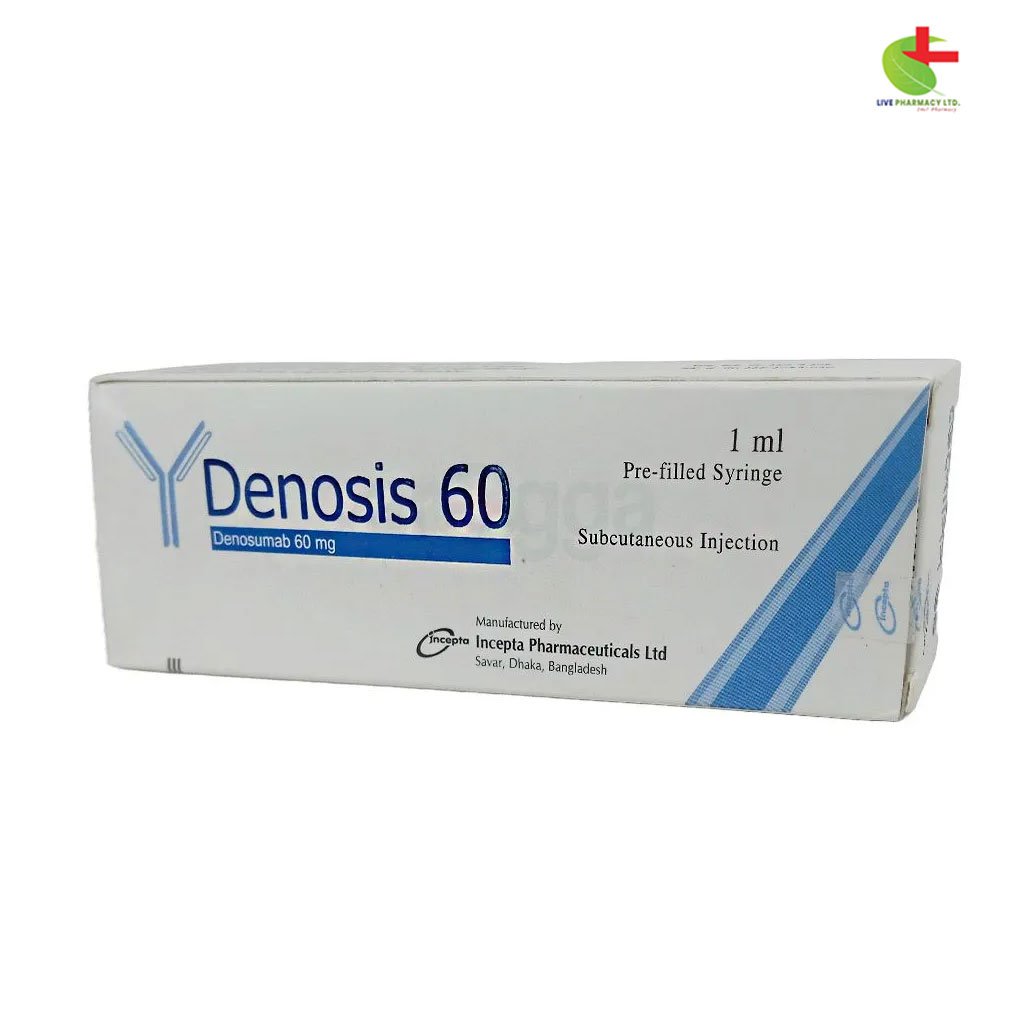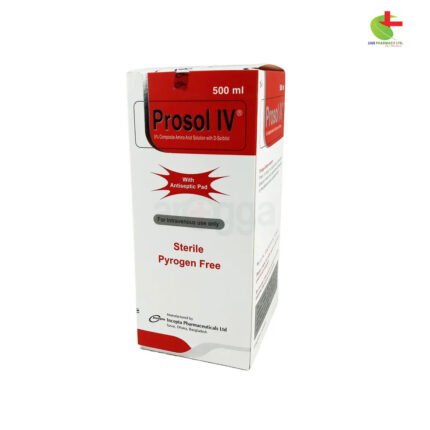Denosis Injection
18,000.00৳ Syringe(1ml)
- Denosis is a RANK ligand inhibitor indicated for treating osteoporosis in postmenopausal women and men, glucocorticoid-induced osteoporosis, and bone loss due to hormone therapy for cancer.
- It helps increase bone mass and reduces fracture risk in high-risk patients.
- Denosis is administered via subcutaneous injection and should be given every six months for osteoporosis or every four weeks for other indications.
- The drug requires monitoring for hypocalcemia, hypersensitivity, and potential serious side effects such as osteonecrosis of the jaw.
 Brand
Brand
|
Incepta Pharmaceuticals Ltd |
|---|---|
 Generics
Generics
|
Denosumab |
 Type
Type
|
SC Injection |
Indications
Denosis is a RANK ligand (RANKL) inhibitor prescribed for various conditions:
1. Treatment of Osteoporosis in Postmenopausal Women: Denosis is recommended for postmenopausal women diagnosed with osteoporosis who are at high risk for fractures. This includes those with a history of osteoporotic fractures or multiple fracture risk factors, as well as patients who have not responded to or cannot tolerate other osteoporosis treatments. It effectively reduces the occurrence of vertebral, nonvertebral, and hip fractures.
2. Increasing Bone Mass in Men with Osteoporosis: Denosis is indicated for men with osteoporosis who are at high risk for fractures, characterized by previous osteoporotic fractures or multiple risk factors, including those who have experienced treatment failures or intolerance to other therapies.
3. Glucocorticoid-Induced Osteoporosis: Denosis is utilized for men and women with glucocorticoid-induced osteoporosis at high fracture risk. This includes individuals starting or continuing systemic glucocorticoids at daily doses equivalent to 7.5 mg or more of prednisone, expected to remain on glucocorticoids for at least six months.
4. Bone Loss in Men Undergoing Androgen Deprivation Therapy for Prostate Cancer: Denosis is indicated to enhance bone mass in men at high risk for fractures who are receiving androgen deprivation therapy for nonmetastatic prostate cancer, helping to reduce the incidence of vertebral fractures.
5. Bone Loss in Women on Adjuvant Aromatase Inhibitor Therapy for Breast Cancer: Denosis is used to improve bone mass in women at high risk for fractures receiving adjuvant aromatase inhibitor therapy for breast cancer.
6. Prevention of Skeletal-Related Events in Multiple Myeloma and Bone Metastasis: Denosis is prescribed to prevent skeletal-related events in patients suffering from multiple myeloma and those with bone metastases originating from solid tumors.
7. Treatment of Giant Cell Tumor of Bone: Denosis is indicated for adults and skeletally mature adolescents with unresectable giant cell tumors of bone or those whose surgical removal may lead to significant morbidity.
8. Treatment of Hypercalcemia of Malignancy: Denosis is also utilized in managing hypercalcemia of malignancy that does not respond to bisphosphonate therapy.
Always consult a registered healthcare professional before taking this medication.
Pharmacology
Denosumab is a human IgG2 monoclonal antibody that specifically targets RANKL, a crucial protein involved in the formation, function, and survival of osteoclasts, the cells responsible for bone resorption. By binding to RANKL, Denosumab inhibits its interaction with the RANK receptor on osteoclasts and their precursors, which decreases bone resorption and increases bone mass and strength in both cortical and trabecular bone.
Dosage & Administration
Denosumab must be administered by a healthcare provider. It is intended for subcutaneous use only; intravenous, intramuscular, or intradermal administration is not permitted.
- Osteoporosis and Bone Loss: Administer 60 mg every six months via subcutaneous injection in the upper arm, upper thigh, or abdomen. Patients should also take 1000 mg of calcium and at least 400 IU of vitamin D daily. If a dose is missed, it should be given as soon as possible, followed by the next dose six months later.
- Multiple Myeloma and Bone Metastasis: Administer 120 mg every four weeks via subcutaneous injection.
- Giant Cell Tumor of Bone: Administer 120 mg every four weeks, with additional doses of 120 mg on Days 8 and 15 during the first month of treatment.
- Hypercalcemia of Malignancy: Administer 120 mg every four weeks, with additional doses of 120 mg on Days 8 and 15 during the first month of treatment.
Always consult a registered healthcare professional before taking this medication.
Interaction
In patients with postmenopausal osteoporosis, a 60 mg subcutaneous injection of Denosumab has shown no effect on the pharmacokinetics of midazolam, a drug metabolized by cytochrome P450 3A4 (CYP3A4). This suggests that Denosumab does not interfere with the metabolism of drugs processed by this enzyme.
Contraindications
- Hypocalcemia: Correct any pre-existing hypocalcemia before initiating Denosumab treatment.
- Pregnancy: Denosumab may harm the fetus. Women of reproductive potential should undergo pregnancy testing before treatment.
- Hypersensitivity: Denosumab is contraindicated in individuals with a history of systemic hypersensitivity to any component of the product, including anaphylaxis, facial swelling, and urticaria.
Side Effects
Common adverse reactions associated with Denosumab include:
- Postmenopausal Osteoporosis: Back pain, extremity pain, hypercholesterolemia, musculoskeletal pain, and cystitis.
- Male Osteoporosis: Back pain, arthralgia, and nasopharyngitis.
- Glucocorticoid-Induced Osteoporosis: Back pain, hypertension, bronchitis, and headache.
- Bone Loss from Hormone Ablation: Arthralgia and back pain, with musculoskeletal pain and extremity pain reported.
- Bone Metastasis: Fatigue, hypophosphatemia, and nausea.
- Multiple Myeloma: Diarrhea, nausea, anemia, back pain, and others.
- Giant Cell Tumor of Bone: Arthralgia, headache, nausea, and fatigue.
- Hypercalcemia of Malignancy: Nausea, dyspnea, decreased appetite, and others.
Pregnancy & Lactation
Pregnancy: Denosumab can cause fetal harm. Women of reproductive potential should use effective contraception during treatment and for at least five months after the last dose.
Lactation: Consider the benefits of breastfeeding against the mother’s need for Denosumab and potential risks to the breastfeeding child.
Precautions & Warnings
- Hypersensitivity: Anaphylactic reactions may occur. Discontinue if a significant reaction occurs.
- Hypocalcemia: Monitor calcium levels during treatment, especially in the initial weeks, and ensure adequate supplementation.
- Osteonecrosis of the Jaw: Conduct an oral examination before starting Denosumab and monitor for symptoms. Avoid invasive dental procedures.
- Atypical Femoral Fractures: Evaluate any thigh or groin pain for potential femoral fractures.
- Multiple Vertebral Fractures: Assess fracture risk if Denosumab is discontinued and transition to another antiresorptive agent as necessary.
- Infections: Serious infections may occur; advise patients to seek medical help for symptoms.
- Severe Pain: Discontinue use if severe bone, joint, or muscle pain develops.
Use in Special Populations
- Pediatric Patients: Denosumab is not approved for pediatric use, except for skeletally mature adolescents with giant cell tumor of bone.
- Geriatric Patients: No significant safety or efficacy differences compared to younger patients.
- Renal Impairment: No dose adjustment needed, but monitor calcium levels in patients with renal impairment.
- Hepatic Impairment: No clinical studies have evaluated Denosumab’s pharmacokinetics in hepatic impairment.
Therapeutic Class
Denosumab is classified as a bone resorption inhibitor.
Storage Conditions
Store Denosis in a refrigerator at 2°C to 8°C in its original carton. Do not freeze. Once removed from refrigeration, it must not be exposed to temperatures above 25°C or direct light and must be used within 14 days. Discard any unused portion after 14 days. Protect from direct light and heat, and avoid vigorous shaking.













Reviews
There are no reviews yet.